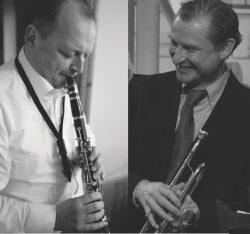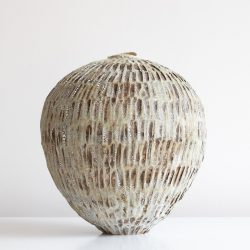 THE autumn programme at Sladers Yard, the West Bay gallery, cafe and arts centre, gets under way with an exhibition running throughout October, featuring recent paintings by a gallery regular, a jazz concert with some favourite musicians and the latest in the series of Help Our Planet (HOP) talks.
THE autumn programme at Sladers Yard, the West Bay gallery, cafe and arts centre, gets under way with an exhibition running throughout October, featuring recent paintings by a gallery regular, a jazz concert with some favourite musicians and the latest in the series of Help Our Planet (HOP) talks.
Skylines, the exhibition that runs to 2nd November, includes a series of paintings, West Bay and the Chesil Beach distilled, a natural landscape shaped by the sea – paintings by Alex Lowery, with ceramics by Lise Herud Braten and furniture by Petter Southall, the designer-maker based at Sladers Yard.
On Saturday 19th October, Sladers Yard presents jazz stars Alan Barnes, clarinet/saxophones, David Newton on piano, Ian Smith on trumpet with his memorable introductions and Ashley John Long on bass, a quartet of world-class jazz musicians playing classics from the history of jazz in superb style with plenty of banter, anecdotes and laughter, accompanied by dinner.
 Alan Barnes is best known for his work on clarinet, alto and baritone sax where his flawless musicianship and warm rapport with audiences have made him uniquely popular in British jazz. He has received more than 25 British Jazz Awards, and has twice been BBC Jazz Musician of the Year. He is a firm favourite at Sladers Yard where he brings an exceptional quartet – David Newton has been voted Best British Jazz Piano Player 16 times in the British Jazz Awards.
Alan Barnes is best known for his work on clarinet, alto and baritone sax where his flawless musicianship and warm rapport with audiences have made him uniquely popular in British jazz. He has received more than 25 British Jazz Awards, and has twice been BBC Jazz Musician of the Year. He is a firm favourite at Sladers Yard where he brings an exceptional quartet – David Newton has been voted Best British Jazz Piano Player 16 times in the British Jazz Awards.
The theme of the next HOP talk on Thursday 24th October is regenerative pest management and farming, with agronomist Richard Harding, Groundswell, and Sir Philip Colfox, owner of Symondsbury Estate, two speakers who are helping to reduce pollution and support the ecosystems that we all depend upon so vitally.
 Since the mid-20th century agriculture has steadily shifted towards intensive farming systems relying on increased use and dependency on artificial fertilisers, pesticides and herbicides. This has maximised food production, but scientific evidence is now showing that these methods are increasingly unsustainable with profound consequences resulting in damaged soil health and nature overall.
Since the mid-20th century agriculture has steadily shifted towards intensive farming systems relying on increased use and dependency on artificial fertilisers, pesticides and herbicides. This has maximised food production, but scientific evidence is now showing that these methods are increasingly unsustainable with profound consequences resulting in damaged soil health and nature overall.
So, how do we help farmers increase their yields while protecting the environment? Low input organic/regenerative farming systems rely less on chemical inputs and more on natural/traditional methods of farm and soil management. This is an approach that works with nature – not against it.
Pictured: West Bay 317, 2022. oil on canvas, by Alex Lowery; ceramics by Lise Herud Braten; and jazz musicians Alan Barnes and David Newton.